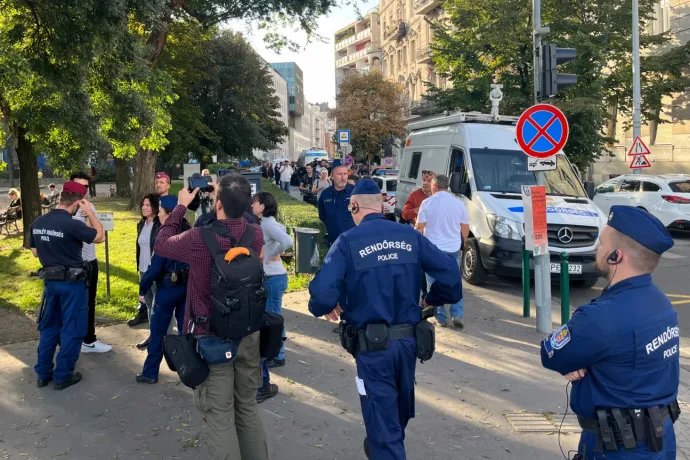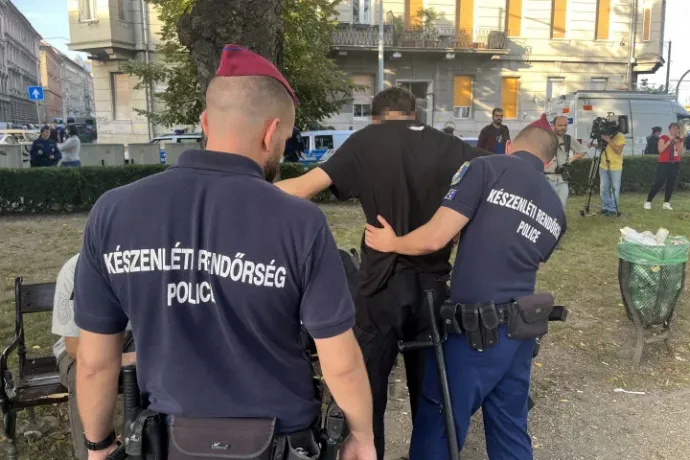They wanted to protest for the Palestinians, not Hamas, but at Orbán's word, the police banned the demonstration immediately

Around 300 participants were expected at the pro-Palestinian demonstration planned for 13 October in front of the Foreign Ministry in Budapest. Aref Mohamed, president of the Association of Palestinians Living in Hungary, was to be the keynote speaker at the two-hour event, and his speech, obtained by Telex, would have focused on the Israeli-Palestinian conflict. Among others, the speech would have mentioned that humanity had failed because of slavery and slave trade, the Holocaust and then apartheid in South Africa, and also on the armed conflict between Hamas and Israel.
Aref Mohamed had planned to elaborate on that (quote) later in his speech:
“The death of every single human being is a tragedy, be they Jewish, Muslim or Christian. We condemn the killing of every single civilian, and we strongly denounce the killing of innocent people, regardless of which side they come from.”
The Association's leader planned to conclude his words by urging the public to speak out against occupation, oppression and genocide and to stand up for a free Palestine. The Facebook ad for the event was titled Stand with Gaza.
They expected the audience to consist mainly of Arab students living in Hungary, and there were plans for additional speeches, according to the Budapest Police Headquarters' minutes about the official announcement of the demonstration, prepared on 11 October. The students were to speak in Hungarian, Arabic and English about how they experience their parents' lives being in danger every day. They had planned to play Arab music between the speeches, with Palestinian, Egyptian and Hungarian flags in the background. In addition, a petition was to be handed over to a representative of the Ministry of Foreign Affairs and Trade halfway through the planned demonstration, entitled "Standing up for the Palestinian people, distancing ourselves from extremism".
Although neither Aref Mohamed's speech nor the planned programme contained even a single sentence celebrating Hamas's brutal attacks, which have so far claimed more than a thousand lives, the Budapest Police Headquarters banned the demonstration in a decision published on the morning of 13 October, which is also available on the police website. They were also banned from holding a silent commemoration planned for the following day, on the same grounds.
The police had concerns because of the “Day of Wrath”
In the decision on Friday's demonstration, the police said, among other things, that based on the provisions of the Law of Assembly, they had taken into account the large-scale attack on Israel launched by the Hamas terrorist organisation from the Gaza Strip on 7 October. The police also took into account that, following the Israeli response, Hamas founder Khalid Mashal had declared a "Day of Wrath" for 13 October and called on Muslims around the world to show their anger, support Hamas and fight against Jews on that day. In many cities in Western Europe, police have broken up or tried to ban such pro-Palestinian or pro-Hamas demonstrations.
Regarding this, Aref Mohamed told us that members of the Hungarian Palestinian community ignore the instructions of the Hamas founder and stressed:
the Palestinian Liberation Organisation and the Palestinian Authority, led by President Mahmoud Abbas, represent the Palestinian people. Given that Hamas is neither a member of the PLO nor of the Palestinian Authority, it has no legitimacy to represent the Palestinian people.
In the rest of the decision banning Friday's demonstration, the police also pointed out that following the Hamas attacks, demonstrations celebrating them were held in several major European cities, and several of them ended in atrocities.
HCLU: The police relied on assumptions, not evidence
Was the police really justified in banning the two pro-Palestinian demonstrations? We took this question to Szabolcs Hegyi, a legal expert at the Hungarian Civil Liberties Union (HCLU or TASZ in Hungarian), after the organisation issued a statement on the matter on 17 October. In its statement, the HCLU underlined that Hamas' terrorist attack on civilians launched from the Gaza Strip is unacceptable and those responsible must be punished. The lawyer added that there is no justification for the killing of civilians, innocent and unarmed people, and that states are also bound by humanitarian and international legal commitments.

As for the demonstrations planned for Budapest, the lawyer said that, in HCLU's view, the police can lawfully ban a demonstration that can be proven to propagate terrorism and support for terrorist organisations if it would present a demonstrable and direct threat of violating the rights of others. The events planned for 13 and 14 October, however, would have called for solidarity with and a commemoration of the Palestinian civilian victims, Szabolcs Hegyi added. According to him, these recent prohibitory orders are based on the police's assumption of risks of supporting terrorism or propagating terrorist organisations, not on evidence.
With regard to this, Hegyi also pointed out that the demonstration which would have been held on Saturday wouldn't have taken place on the Day of Wrath, and the police's resolution even mentions that the plan was to hold a silent commemoration on 14 October. Additionally,
the organiser of the Saturday event had explicitly indicated to the police that the Palestinian people were not synonymous with Hamas.
According to Hegyi, while the report on the announcement of the demonstration planned for 13 October in front of the Ministry of Foreign Affairs does not contain a similar disassociation, the announcer in this case also assured the police that the event would be law-abiding and peaceful, and that appropriate security arrangements would be made. The organisers committed to putting an end to any disturbances if they had occurred, and if necessary, they were also willing to disperse the demonstration.
In Hegyi's view, the police's conclusion that the demonstrations planned in Budapest were pro-Hamas disregarded the organisers' statements, and were based on assumptions. The HCLU considers these assumptions problematic.
No counter-demonstration was announced
According to the Law of Assembly, a demonstration may be banned or restricted if, based on the information available from the submitted announcement and following consultation with the organisers, there is reason to believe that the meeting will be unlawful. This time, however, there were no reasonable grounds to assume that this was the case with either of the planned events, especially not Saturday's, Hegyi added.
With regard to banning the demonstration planned for last Friday, the legal expert also finds it objectionable that the reasoning behind the decisions does not indicate whether the police did everything possible to avoid the need to restrict or ban the events. It is not clear from the minutes whether it was pointed out to the organiser that the leader of Hamas had announced a 'Day of Wrath' for 13 October, nor whether it was suggested that they should choose another date.
In Hegyi's view, this would have been necessary because in a situation like this, where the event could potentially turn into a pro-Hamas demonstration, the police should have made this risk explicitly clear. They should have checked with the organiser whether he was aware of the risks involved in holding the demonstration. If they had asked Aref Mohamed to make a statement about this, and if he had still insisted on the date, then, according to Szabolcs Hegyi, the police's conclusion to ban the demonstration planned in front of the Foreign Ministry would have been somewhat more justified.
The police also cited the risk of a possible counter-demonstration, despite the fact that no such event had been announced for 13 or 14 October, the lawyer pointed out in his statement to Telex. However, according to the HCLU staff member, this would not have justified the ban either. Instead, it would have been a matter of ensuring that the demonstration and the counter-demonstration were properly separated from each other in order to prevent conflict between the participants.
Orbán: A sympathy demonstration would in itself constitute a terrorist threat
On 13 October, just before the resolutions banning the pro-Palestinian demonstrations planned for that day and the following day were issued, Prime Minister Viktor Orbán spoke on public radio and said that “there would be no pro-terror demonstrations in Hungary”, and soon afterwards posted a similar statement on his Facebook page. Later, in response to a question from Telex, Bertalan Havasi, the Prime Minister's Press Chief confirmed that Orbán had acted personally when he learned that a demonstration was planned for Friday in front of the Ministry of Foreign Affairs and Trade.
The Prime Minister said that "the next thing which is shocking and should set off the alarm bells in our minds is that there are sympathy demonstrations in support of terrorists all over Europe.
They even tried to do it in Hungary, but organizing a sympathy protest is not an option here, because that in itself would pose a terrorist threat to Hungarian citizens, so they should forget about that."
Commenting on this, Hegyi said that the police was not tasked with following the Prime Minister's orders. Instead, it must – based on the Law of Assembly – judge whether there are any legal grounds for restricting or prohibiting the announced gathering. The HCLU's view is that the police may then make its decision based on this – either one which pleases the Prime Minister or one which doesn't.
For more quick, accurate and impartial news from and about Hungary, subscribe to the Telex English newsletter!